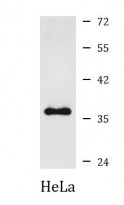ARG59391
anti-TREX1 antibody
anti-TREX1 antibody for ICC/IF,Western blot and Human,Mouse,Rat
Overview
| Product Description | Rabbit Polyclonal antibody recognizes TREX1 |
|---|---|
| Tested Reactivity | Hu, Ms, Rat |
| Tested Application | ICC/IF, WB |
| Host | Rabbit |
| Clonality | Polyclonal |
| Isotype | IgG |
| Target Name | TREX1 |
| Antigen Species | Human |
| Immunogen | Recombinant fusion protein corresponding to aa. 1-270 of Human TREX1 (NP_057465.1). |
| Conjugation | Un-conjugated |
| Alternate Names | CRV; Three-prime repair exonuclease 1; AGS1; DRN3; 3'-5' exonuclease TREX1; DNase III; HERNS; EC 3.1.11.2 |
Application Instructions
| Application Suggestion |
|
||||||
|---|---|---|---|---|---|---|---|
| Application Note | * The dilutions indicate recommended starting dilutions and the optimal dilutions or concentrations should be determined by the scientist. | ||||||
| Positive Control | HeLa | ||||||
| Observed Size | 37 kDa |
Properties
| Form | Liquid |
|---|---|
| Purification | Affinity purified. |
| Buffer | PBS (pH 7.3), 0.02% Sodium azide and 50% Glycerol. |
| Preservative | 0.02% Sodium azide |
| Stabilizer | 50% Glycerol |
| Storage Instruction | For continuous use, store undiluted antibody at 2-8°C for up to a week. For long-term storage, aliquot and store at -20°C. Storage in frost free freezers is not recommended. Avoid repeated freeze/thaw cycles. Suggest spin the vial prior to opening. The antibody solution should be gently mixed before use. |
| Note | For laboratory research only, not for drug, diagnostic or other use. |
Bioinformation
| Database Links | |
|---|---|
| Gene Symbol | TREX1 |
| Gene Full Name | three prime repair exonuclease 1 |
| Background | This gene encodes a nuclear protein with 3' exonuclease activity. The encoded protein may play a role in DNA repair and serve as a proofreading function for DNA polymerase. Mutations in this gene result in Aicardi-Goutieres syndrome, chilblain lupus, Cree encephalitis, and other diseases of the immune system. Alternative splicing results in multiple transcript variants. [provided by RefSeq, Sep 2012] |
| Function | Major cellular 3'-to-5' DNA exonuclease which digests single-stranded DNA (ssDNA) and double-stranded DNA (dsDNA) with mismatched 3' termini. Prevents cell-intrinsic initiation of autoimmunity. Acts by metabolizing DNA fragments from endogenous retroelements, including L1, LTR and SINE elements. Unless degraded, these DNA fragments accumulate in the cytosol and activate the IFN-stimulatory DNA (ISD) response and innate immune signaling. Prevents chronic ATM-dependent checkpoint activation, by processing ssDNA polynucleotide species arising from the processing of aberrant DNA replication intermediates. Inefficiently degrades oxidized DNA, such as that generated upon antimicrobial reactive oxygen production or upon absorption of UV light. During GZMA-mediated cell death, contributes to DNA damage in concert with NME1. NME1 nicks one strand of DNA and TREX1 removes bases from the free 3' end to enhance DNA damage and prevent DNA end reannealing and rapid repair. [UniProt] |
| Cellular Localization | Nucleus. Cytoplasm, cytosol. Endoplasmic reticulum membrane; Peripheral membrane protein. Note=Retained in the cytoplasm through the C-terminal region (By similarity). In response to DNA damage, translocates to the nucleus where it is specifically recruited to replication foci. Translocation to the nucleus also occurs during GZMA-mediated cell death. [UniProt] |
| Calculated MW | 33 kDa |
| PTM | Ubiquitinated, but not targeted to proteasomal degradation. Ubiquitination may be important for interaction with UBQLN1. [UniProt] |
Images (1) Click the Picture to Zoom In






